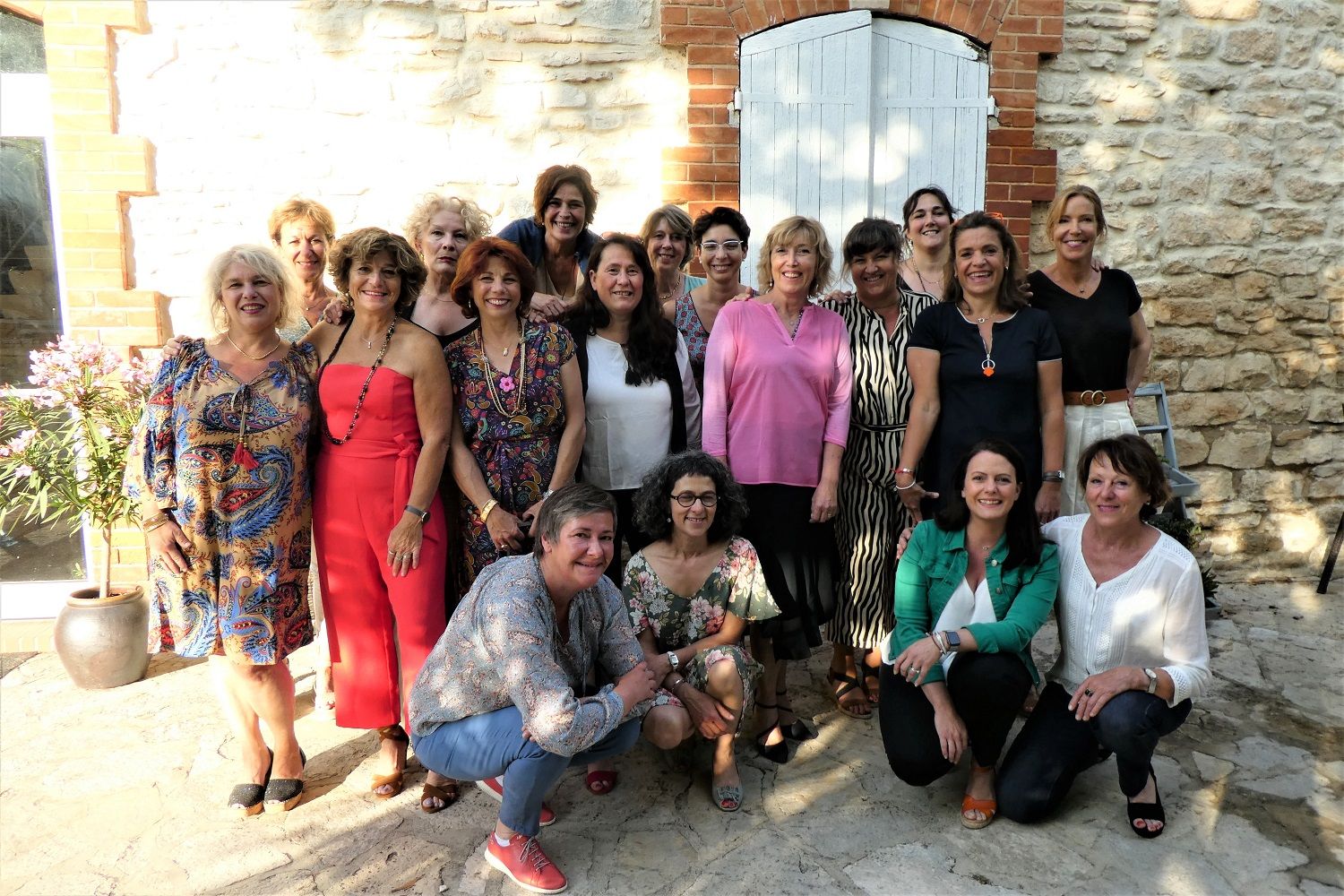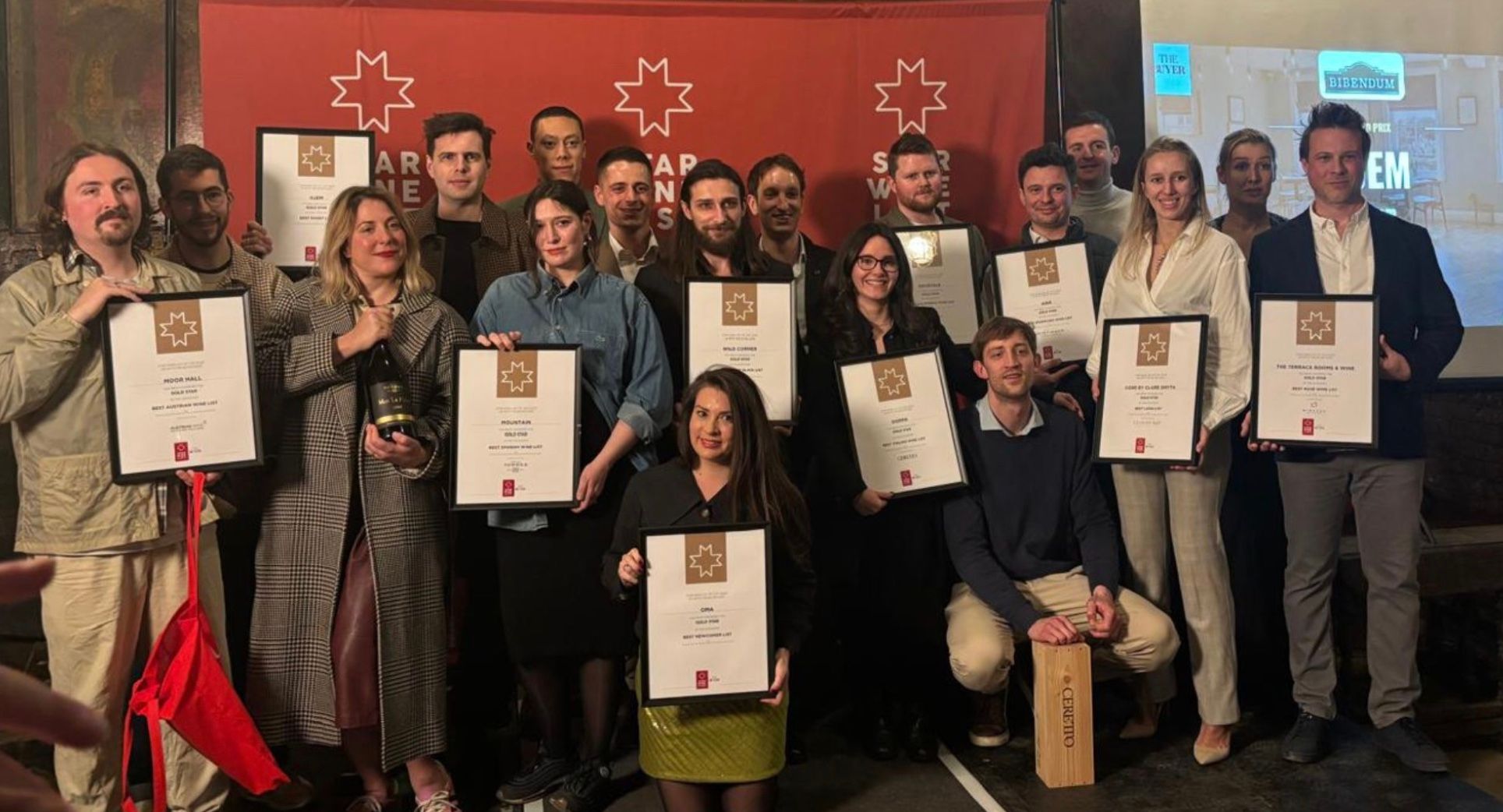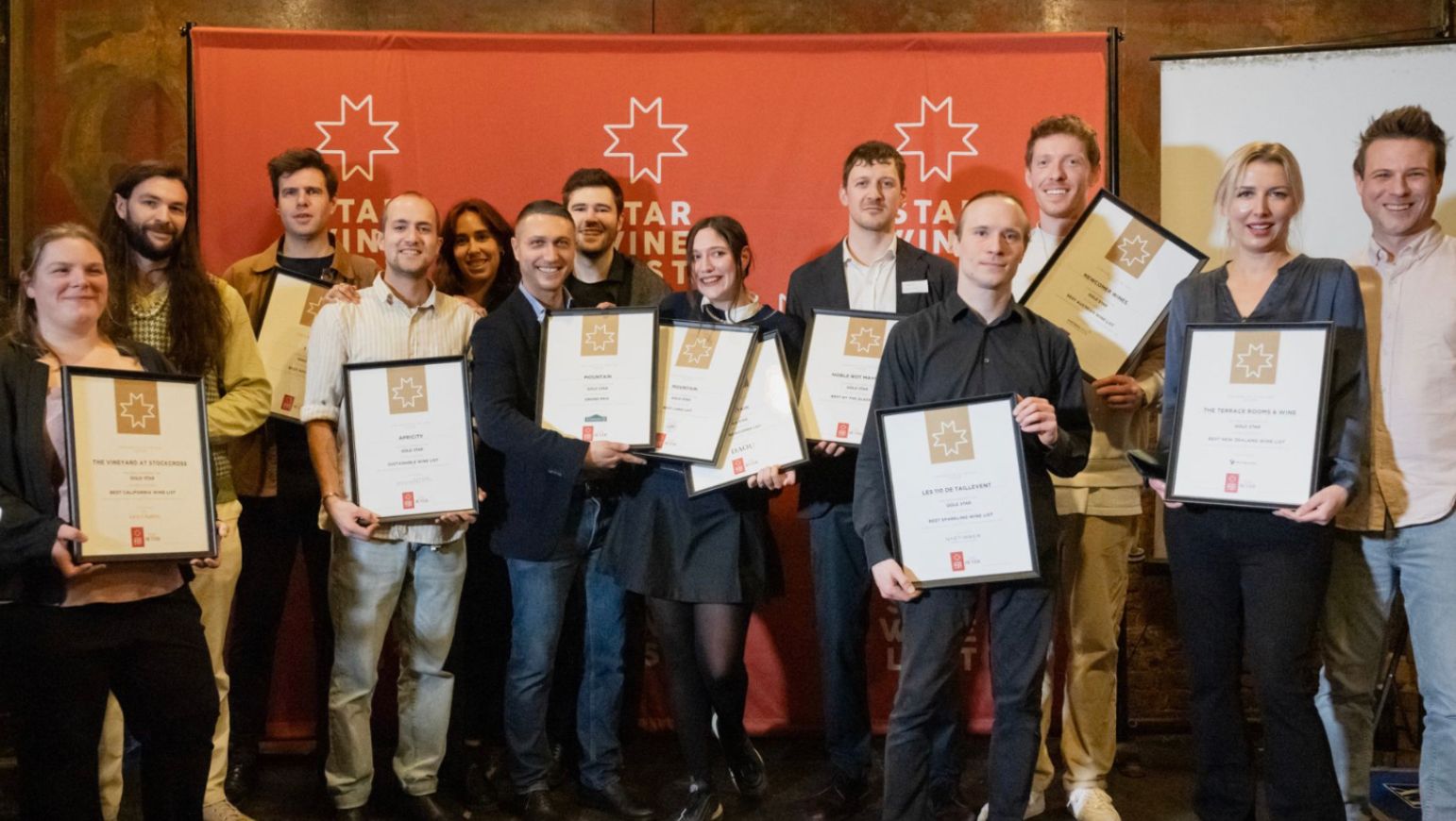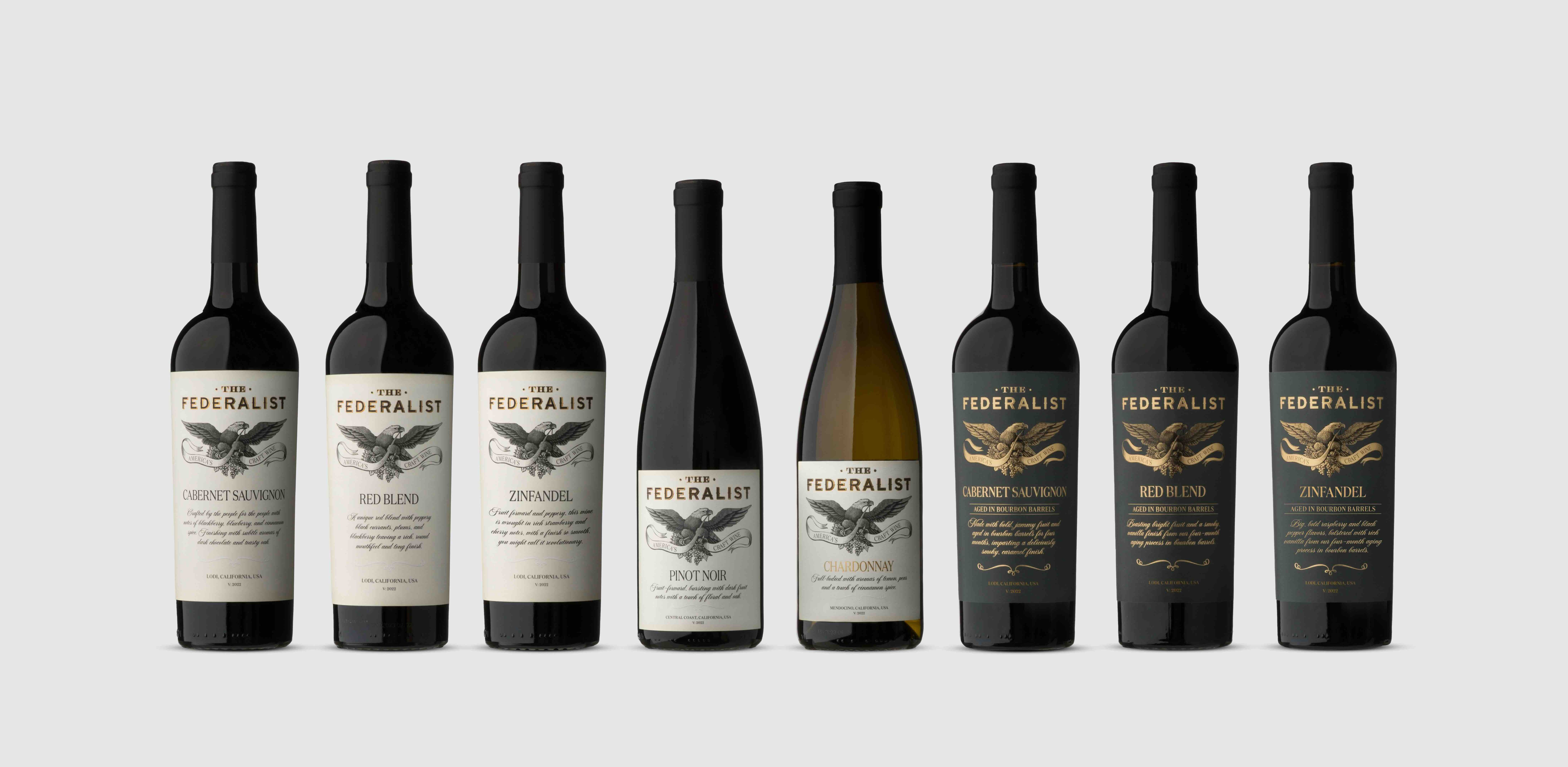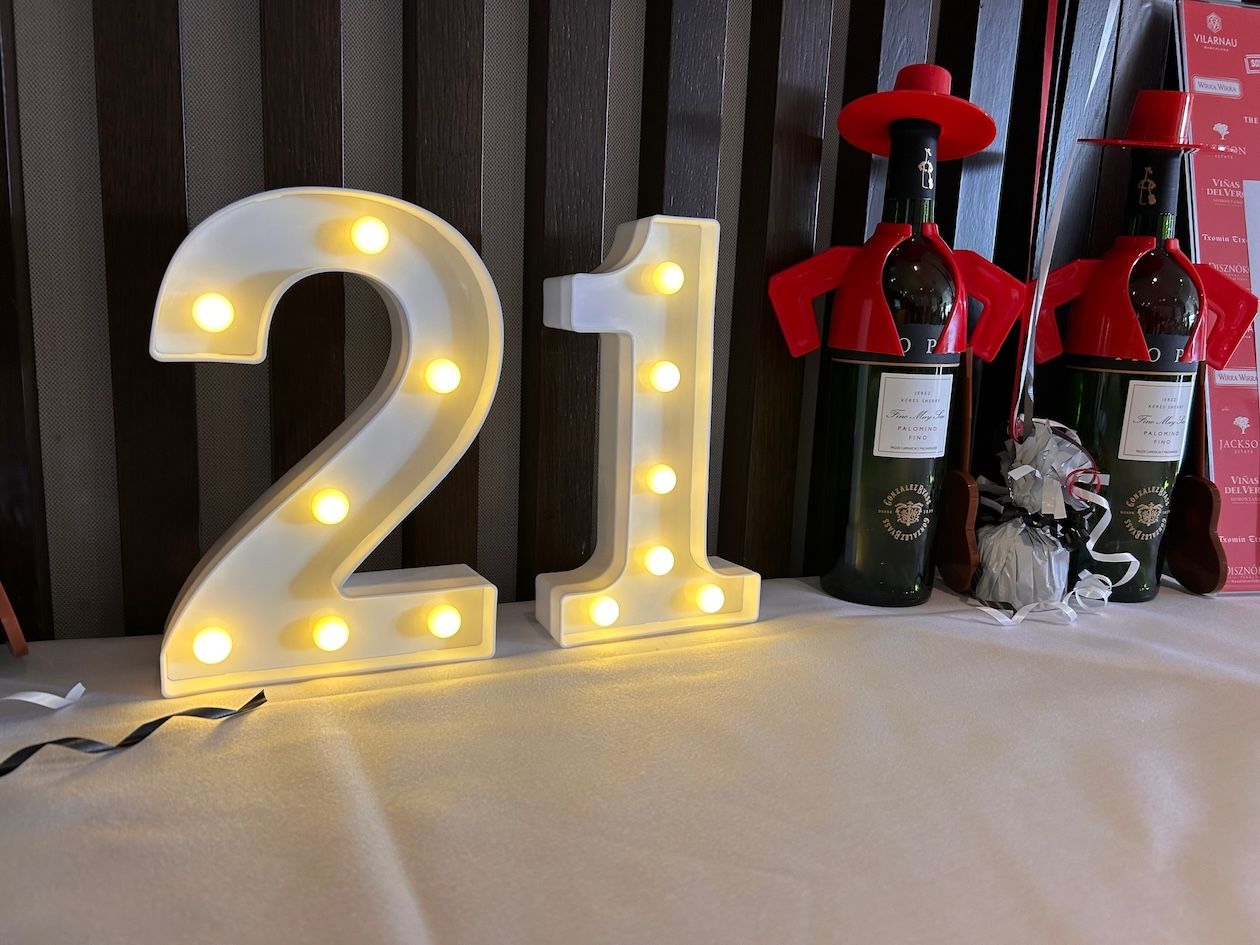“To hear a light, fruity, supple wine described as “feminine” still makes me scream (with laughter!),” says Francoise Ollier.
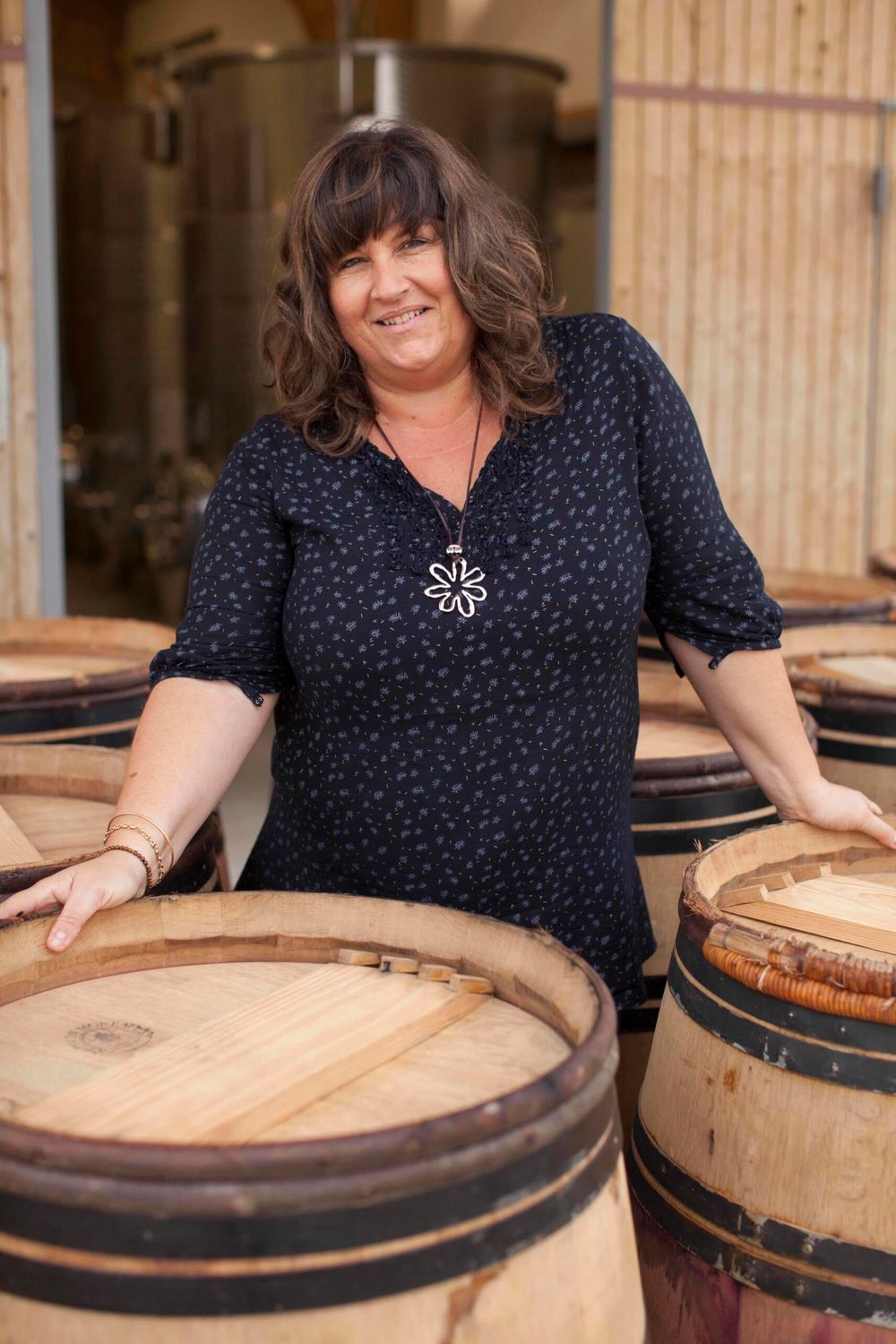
Francoise Ollier. “When a young vigneronne introduces her wine to professionals or private customers, it is quite common for them to ask to speak to her father or her husband.”
Francoise Ollier is the new president of the women winemakers’ association Vinifilles of Languedoc Roussillon. She is the co-owner with her brother of the influential Domaine Ollier-Taillefer in Faugères and was the former director of the Faugères Cru in the Languedoc.
So what is Vinifilles?
It’s an association of really dynamic and collaborative women winemakers who either own or share their estates with siblings, husbands or parents. We’re in the South of France, in a region now known as Occitanie, though all our members come exclusively from the Languedoc and Roussillon part of it.
It’s an incredibly diverse group, with an age span of 40 years between the oldest and the youngest members. We all come from different starting points: some of us are born here, some come from other parts of France, or even other countries. Some are sixth generation wine-growers, others are zero generation… some own large estates, others have bijou biodynamic vineyards.
A lot of Vinifilles inherited their vineyards, but we have many who started from scratch … There are women who are oenologists and agronomists by training, while others have a background that has nothing to do with wine.
What holds us together is the love of what we are doing, we all actually love and live for our work. Passion is an overworked word, I know, but I can’t think of a better one. For those of us born into it, this passion is in our blood. For those who came to it later, it’s colonised their hearts.
How did it originate and what are its objectives?
Originally, it was Pascale Rivière of la Jasse Castel, who got together with some fellow female wine-grower friends to create a network for mutual help and exchange of ideas, so that they could discuss their common problems and shared experiences. That was the beginning of the Vinifilles, in 2009. It has grown to 21 members, and the original objectives remain pretty much the same: mutual aid and further training and workshops on agricultural or technical issues … this includes things like biodynamics, gentler methods of pruning, life of the soils and so on.
There’s also the ever-burning question of ‘transmission’ – it’s really important that young generations learn that there are so many job possibilities and opportunities in the world of the vine and the wine, things they may never have heard of or thought of. And of course, they should learn how to really appreciate a great glass of wine!
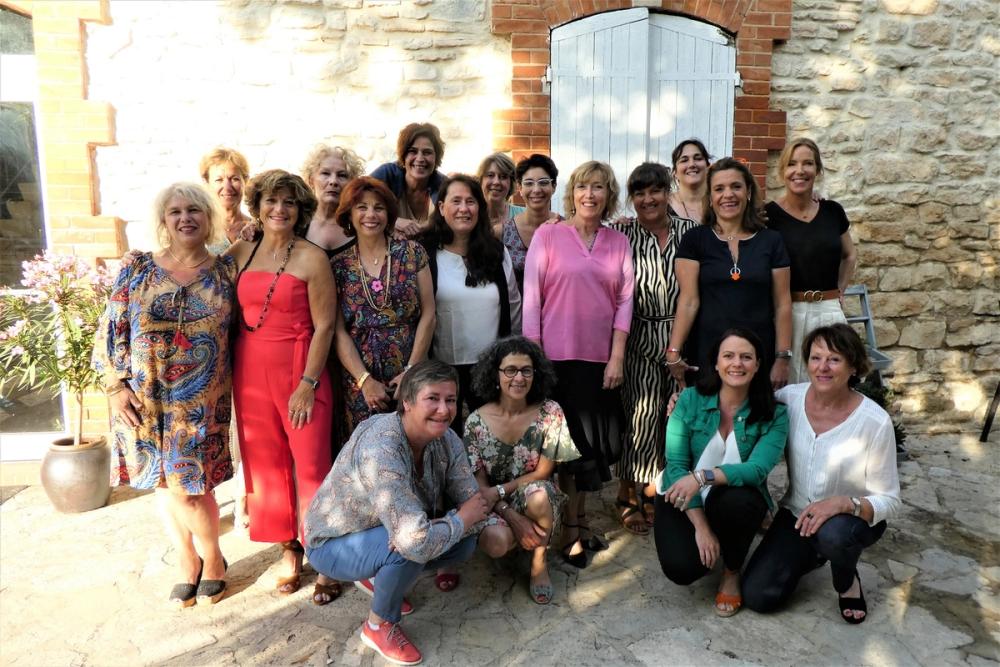
Stronger together: 18 women winemakers from the current 21 members of Vinifilles
How many women winemakers work in Occitanie? And is this number growing?
The fact is, women were always there, in the French vineyard, but they were not often acknowledged. One of our members is actually the daughter of a daughter of a daughter.
The role of women only began to be properly recognised, though to a small degree, about 40 years ago.
Today, however, it’s not unusual to see a woman setting up on her own. This is no longer an outrageous exception, and probably even less so in Occitanie, where our good climate may be an encouraging factor to help them take this step. At the same time, mechanisation nowadays allows women to easily do all the jobs that have to be done in viticulture. Physical strength is no longer a primary necessity, even if the job is still physical.
But I must say, this is a difficult question to answer! It’s because of that word “winemaker”. Did you know that the Larousse dictionary doesn’t even have a translation for it? France is very much the land of the “vigneron” – or “vigneronne” if she’s a woman – which Larousse translates back into the more holistic terms, wine-grower or wine-producer, that is, the person who grows, makes, nurtures, bottles, administrates, and sells their wine and not specifically the person who oversees the transformation of grape juice.
This is not a question of semantics, it’s a question of philosophy.
In the Vinifilles group, about half the members are solely responsible for their vineyards, that is, they do everything from making the wine to the administrative work, the viticulture … and let’s not forget the all-important commercial side as well! The other half shares these jobs with their spouses or brothers or fathers, but they are no less “vigneronnes” for that.
I’ve asked around if anyone has any official figures on women involved in the making of wine in France, and unsurprisingly, there don’t appear to be any. I would guess that among the Vignerons Independents, the independent, family-run wine estates that account for an important part of the French wine landscape, at least half of them have women partners, mostly in admin and sales. It’s a different story with the cooperatives where there’s probably only about 5% or so.
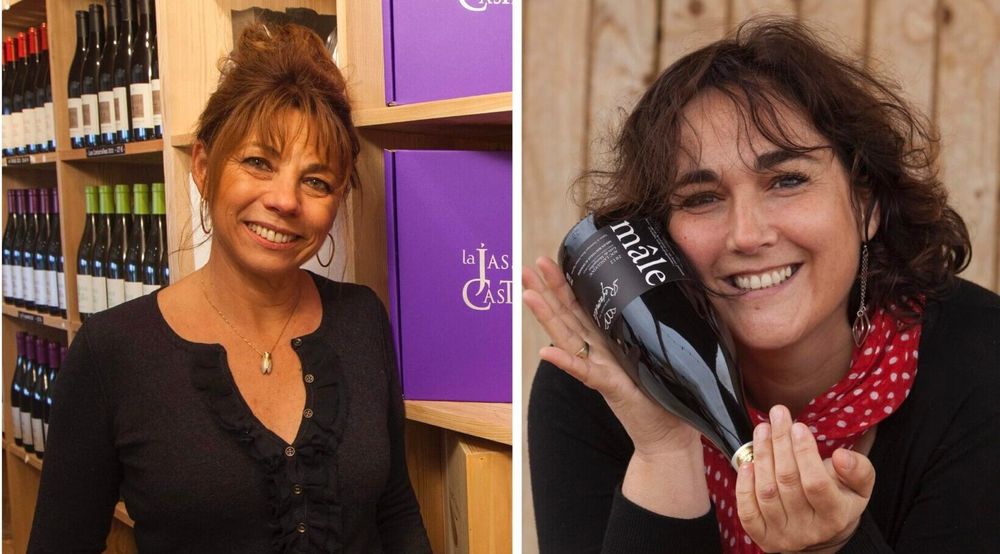
Outgoing president Valerie Tabaries Ibanez of Domaine Roquemale in Grés de Montpellier (right) and founding president Pascale Rivière of la Jasse Castel in Montpeyroux
Why is Vinifilles necessary, in your opinion?
Just as with good wine, balance is the all-import thing. It is not necessary to have more women or more men in our business… all that’s needed is a good balance between the two. The Vinifilles are neither militantly pro-women nor at all anti-men, but harmony and balance matter very much – in life as much as in wine.
In my experience though, women tend to approach things differently and talk about wine in a simpler, though not unprofessional, way. I don’t like generalisations, but I think it’s true to say that women are great organisers, and probably also generally derive real pleasure from communicating with their customers.
There’s a word an English friend made up: womenergy. The collective energy of women is not a concept, it’s a reality, and you can see it at play with the Vinifilles. We enjoy meeting and talking to each other not only to discuss our problems, but more to communicate about wine in an open and uninhibited way. Such discussion ignites creativity and action… and womenergy.
We also accept that we can be role models for other women and girls, it’s not our intention but it’s almost inevitable – particularly because our enthusiasm is so contagious! School children, girls and boys alike, should know that there is a life for them in the vineyard, and many professions within it to choose from. I’m always delighted, when we do our training sessions with the Sommelier Schools of the region, to see so many young women picking up the gauntlet, which is a fairly modern breakthrough – though sadly once they’ve got that job in a top restaurant, they’re too often taken for the receptionist.
Our presence also encourages female consumers to step forward and not hover behind their men in choosing and tasting wines. Many women actually still feel inhibited to walk into a wine shop and talk with the salesman there, believe it or not, as if wine were exclusively a man’s thing. Funnily enough, I’ve noticed this more in Britain than in France. Not many women will ask for the wine menu in a restaurant either, though it’s quite normal to be given the food menu … I think by having women working in wine will help break these barriers for those who are a bit daunted by it.
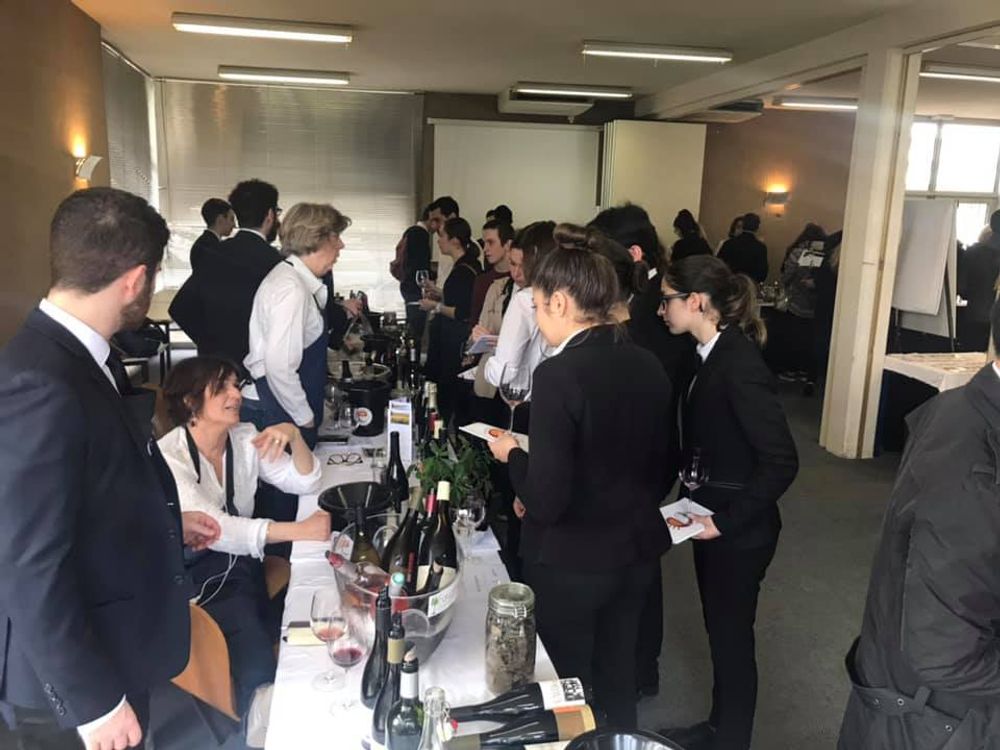
Tasting session with regional sommelier schools, 2020
Give me some examples of the difficulties faced by women winemakers in this region?
In terms of the wider wine world, an obvious problem is women’s access to positions of high political responsibility (I mean “political” in the French wine world). At present, the presidents of interprofessions, appellations (ODG) or regional committees of the INAO, or presidents of appellations are, in 90% of cases, men… over 50 years. But that’s not because these institutions are closed to women, it’s more because the women aspiring to these jobs often have to manage the house, the children, and at least the administrative and commercial part of their family’s wine business. It’s the same old story, actually, that applies to other professions as well.
When a young vigneronne introduces her wine to professionals or private customers, it is quite common for them to ask to speak to her father or her husband!!!! You have to be a bit older before that stops, though you can continue to be considered an employed saleswoman until a very great age, because people simply can’t quite believe the owner could possibly be a woman. In the collective unconscious, the profession of wine-grower is still associated with the image of a man. But this is changing little by little….
Why Occitanie? Are the problems you encounter universal or particularly evident in Occitanie?
These problems are universal, but they may even be less present in Occitanie.
Occitanie is a land of welcome, a sort of Eldorado, for many neo-wineries. So things have evolved sooner and faster than in other more ‘traditional’ regions.
I have been in this business since I was young and I have always thought that being a woman in a man’s world was actually an asset, and I still think so. I was lucky enough to work with a father at a very young age who didn’t differentiate between my brother and myself.
We are in regular touch with similar associations in other parts of France, each appellation has its own version of the Vinifilles, and we meet up regularly under the national umbrella of the Circle of Wine Women of France. This is how I discovered that our hopes, ideas, and problems are shared and understood by women in wine all over this country, whether they be from Alsace, Burgundy or Roussillon. We share and exchange information, we visit each other’s appellations and taste each other’s wines: it’s a real learning experience, and it’s invigorating and inspiring to know that things can be done another way – and that we’re not living in a vacuum alone.
How do women join and what are the criteria for joining?
The criteria are loose and informal. We will only welcome new members if they produce organic wines from appellations not yet represented in our association. And, of course, they must be dynamic, motivated, collaborative and joyful!
What are the ambitions of the group?
It sounds like a cliché, but we want to make a difference: to make the region’s wines better known, to make wine more approachable, to make the consumer aware that it comes from a vine and not a bottle, and to share the joy of our profession.
We plan to work more on environmental issues. That’s a topic under hot discussion for us at the moment. That includes packaging issues, and a miscellany of other projects, such as informing ourselves about bees and bee-keeping, carbon neutrality, resistant grape varieties And, of course, we will continue our partnerships with the sommelier schools.
Solidarity remains our credo. In the last four years, some of us have had our crops partially or wholly destroyed by mildew (2018), fire (June 2019), frost (2021), floods and vicious episodes of hail…. solidarity through actions and words is therefore essential.
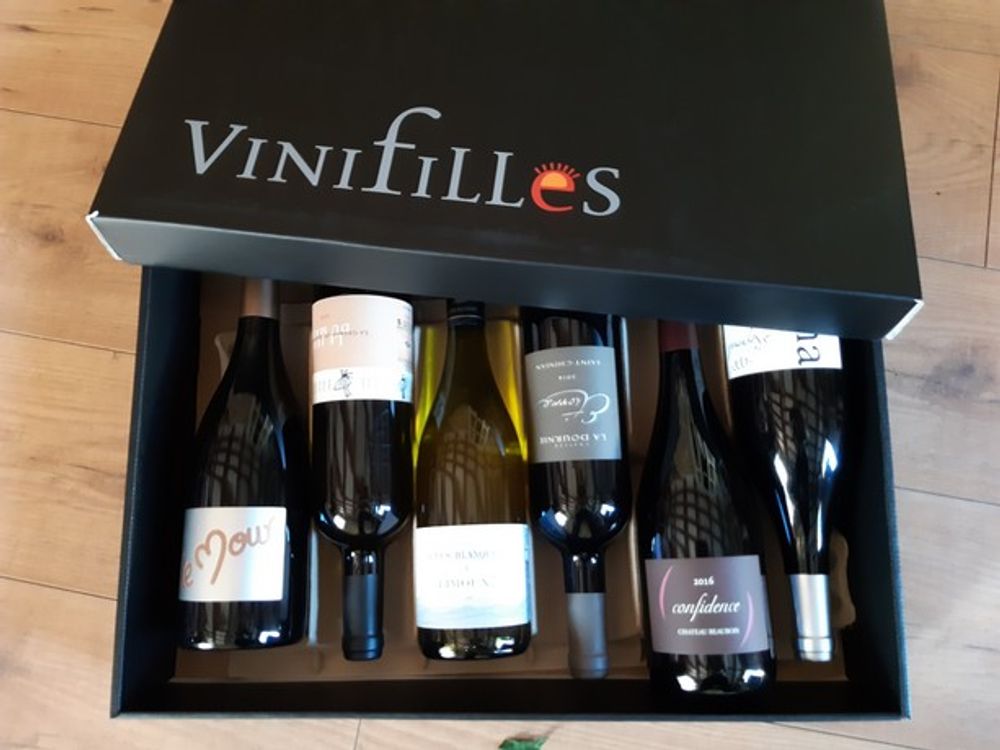
Can you give me some examples of the success of Vinifilles?
A good example of this is when we produced “solidarity” mixed cases of wine to sell in aid of one of our members who lost 100% of her crop to hail, each member donating her wines for this. An auction of our old vintages was also a real fund-raising success for this project.
Our annual session with sommelier students from several schools in the south of France is also a real success: these are tomorrow’s wine professionals, and they will not only remember us, but they will remember and value the wines of our various appellations.
In pre-pandemic days, we used to hold a gala tasting event on the eve of Millésime Bio, which became a real fixture for professionals from around the world.
Are your members also part of other organisations promoting the region and its wines? If so where does one begin and end?
We are all women of character, very dynamic, and many of us are actively involved with our appellations and our Interprofessions, which are official organisations. But the fact that the Occitanie government and Sud de France, who promote the region’s wine as a whole, both also help the Vinifilles by financially supporting many of our projects, must mean they think there’s something complementary but different about what we do.
There are many other groups promoting the region’s wines which the individual members of the Vinifilles may be members of, partnerships between restaurants and wine-growers, and tourist offices and wine-growers, and even wine-growers and wine-growers – they all have something that is as particular to them as our special cohesion and strong collective will is uniquely ours. There’s room for everyone.
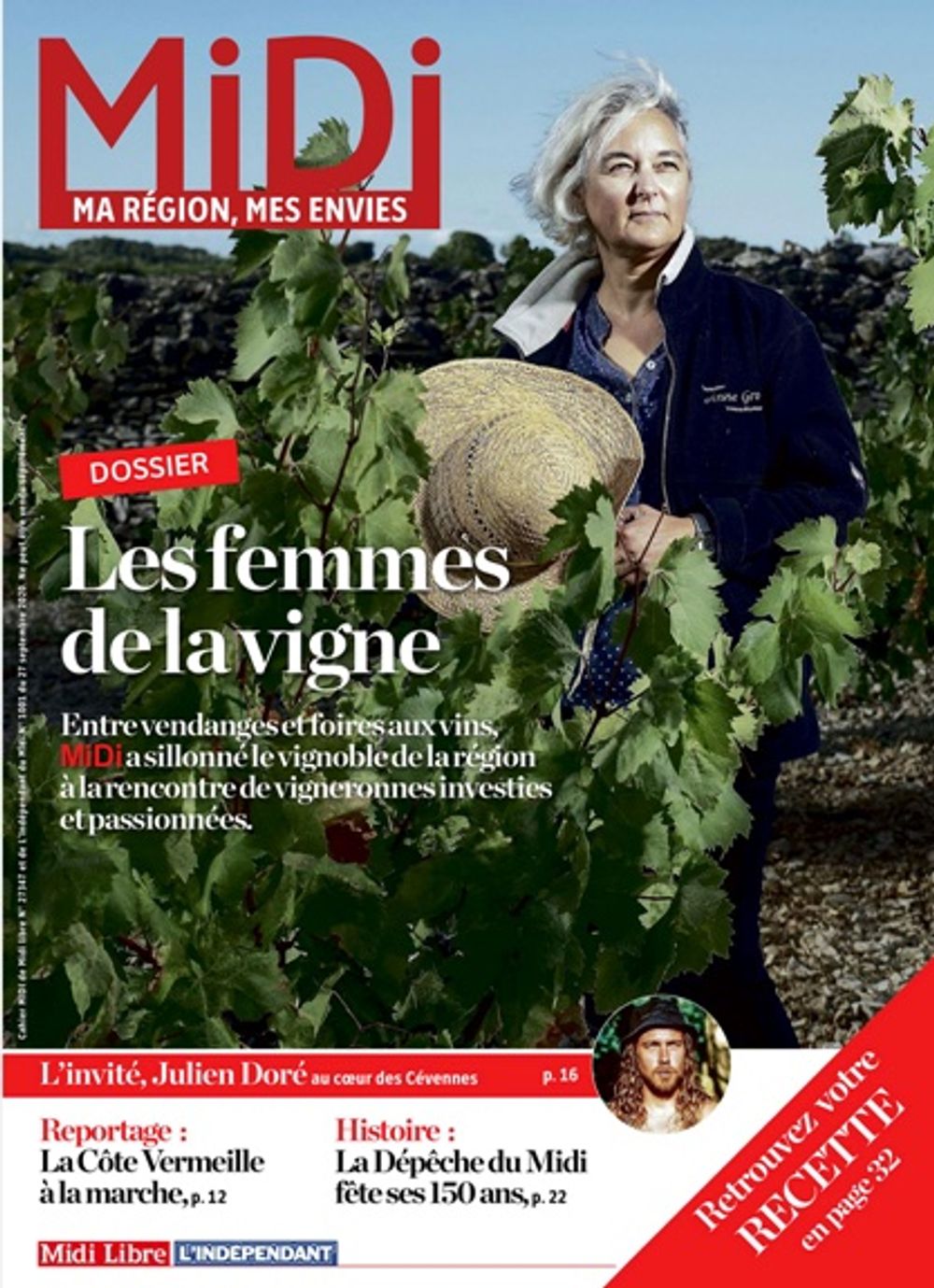
There has been considerable media interest in Vinifilles over the 13 years.
Do you communicate Vinifilles to the end consumer? Ie. is it a part of consumer marketing and communications?
The aim never was to do business and marketing, but it didn’t take long before we realised that our customers enjoy and appreciate the idea of a collaboration of “women winemakers”. This led to the creation of a small online store on our website (www.vinifilles.fr) where we sell mixed cartons of our wines. The revenue from this allows us to finance small actions such as printing brochures, tasting notebooks, a cookbook with the region’s top chefs, and our wine-tourist map showing the “Route des vins des Vinifilles”, which we all give to visitors at our tasting rooms.
We also help our professional clients by grouping their orders together at a single pickup point. This reduces their transport costs enormously, while allowing them to offer their customers a full and complete range of wines from Languedoc and Roussillon. We back this up by personally participating in their tasting events for their customers. It works really well, but only because we are not afraid of pooling our resources and sharing our contacts. The idea would work just as well if we were men, but I do think that women are probably more collaborative and less afraid of competition.
It goes almost without saying that we combine forces not only at professional trade fairs, but also at wine events for the general public, and wine clubs. And, of course, we all have the Vinifilles logo on our own websites and brochures, and bumper-stickers on our cars.
I think you’d be hard-pressed to not have heard of the Vinifilles if you like wine and live in this region!
Do you think the sex of the winemaker is an important factor in making a wine?
No, I don’t really. I don’t believe the one is more conservative, or more innovative, or more responsible than the other. But I do sometimes wonder whether it’s closer to our hearts as women – to work without pesticides in our fields or chemicals in our wines.
How do you feel when a wine is described as being ‘masculine’ or ‘feminine’?
To hear a light, fruity, supple wine described as “feminine” still makes me scream (with laughter!).
